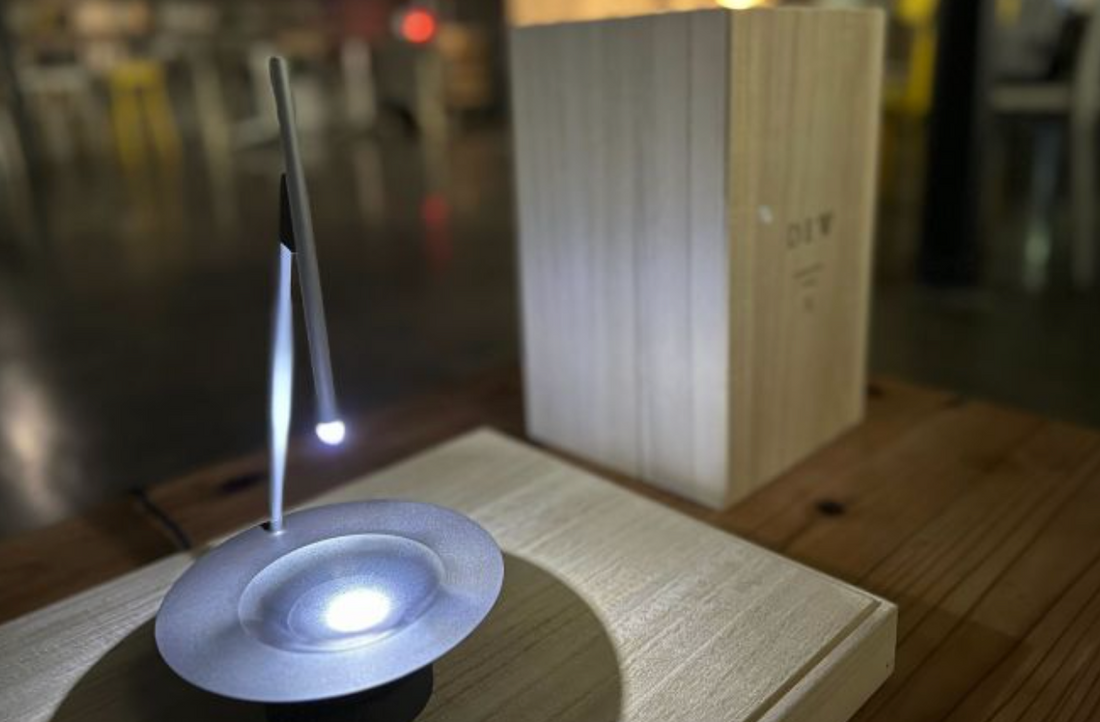"Huh? I wasn't thinking about that at all."

The constant ringing of smartphone notifications and the flood of information on social media. The term "smartphone fatigue" has been around for a long time, but it's hard to distance yourself from the devices that have become part of your daily life... In March, when I heard that I could "meditate" in the hustle and bustle of Shibuya, a reporter who is heavily immersed in the web and has an average daily screen time of four hours headed there.
Experience the art piece "DEW" in Shibuya
In early March, an art experience event called "Do you feel spaced out?" was held at a venue about a 10-minute walk from Shibuya Station.
The lights were dimmed and the ambient sounds of birdsong and babbling water were playing in the background. The organizer and product designer Takahashi Ryoji encouraged me to "sit wherever I like," so I sat down on a sofa.
Right in front of me is "DEW," an art piece created by Takahashi.
This product has an LED light at the end of a rod that extends downwards, and water droplets that have accumulated at the tip fall at regular intervals.
The droplets of water trembling at the end of the light resemble the tips of sparklers.
"Take about 30 minutes to relax," I was told, so I decided to focus on the art.
The droplets of water that have collected the light fall into a puddle about 5 centimeters in diameter created in an aluminum container.
I watched as this was repeated over and over again.
However, as I stared at the work, thoughts were running around in my head: "How does it work?", "I wonder how the person next to me is spending their time?", "Oh, I have a manuscript I haven't written yet..."

"I don't want to think about anything" - Smartphone in backpack
After a while, Takahashi asked me, "How is it? Are you able to space out?" and we chatted about my recent work situation, and I felt like I relaxed a little.
In that state, when I stared again at the light, the water droplets, and the ripples where they landed, I felt a bit dizzy.
"Oh, I don't want to think about it anymore."
I put the Apple Watch I was wearing on my right wrist and the smartphone I had in my pocket into my backpack and decided to concentrate on the particles of light.
"I'm kind of tired. But I guess everyone gets tired. Still, I'm tired. Hmm..."
As my thoughts continued to wander aimlessly, there were moments when I realized, "Huh? I wasn't thinking about anything at all."
I wish it would stay like this forever...By the time I started to feel that way, more than 30 minutes had passed.

Those who showed interest were employees and managers of the information industry.
Takahashi has created many artworks in the past, including a product that uses mirrors to make a single flower look like a bouquet. The idea for this piece actually came to him 13 years ago.
Takahashi says, "When I was a child, I used to spend a lot of time gazing at the pond in the garden," and he has always thought, "The combination of light and water is interesting."
"DEW" is the product that embodied that "fun."
Last year, we applied to "100BANCH" (Shibuya Ward), which Panasonic has been running since 2017 as a place for young people working on various projects to gather. Through the encounters we had there, we have refined DEW.
Originally, DEW was started by Takahashi because he thought it was interesting, and there was no specific purpose for it to be used.
However, after having around 100 people experience DEW and speaking to them, it turns out that those who praised the work highly were people working or managing directors in the information industry, and ultimately thought that "it forces you to turn your attention away from smartphones and computers, and acts as a kind of digital detox."
"In this age of such advanced social media, it's difficult to block out information. I always turn off notifications even when I install an app on my smartphone, but I imagine it must be tough on people who keep notifications on," says Takahashi.
"Through DEW, they may have come to understand the importance of shifting their focus away from their own interests."
DEW says it expects to use the devices for rental or purchase in offices and hotels in the future.



